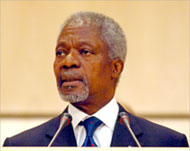Rome meet to push for ceasefire
European leaders at a Middle East conference in Rome plan to push for a ceasefire in Lebanon, deployment of a multinational force to stabilise its border with Israel and help disarm Hezbollah, EU officials have said.

Calls for a ceasefire gathered steam on Tuesday, raising the possibility of differences with the United States, which insists that any truce must lead to a durable peace and ensure that Hezbollah is no longer a threat to Israel.
Officials in Brussels told The Associated Press that Javier Solana, the EU foreign and security affairs chief, will propose at the conference of foreign ministers and other officials on Wednesday that a rapid-reaction force be established.
It would ideally be built around French, German and Spanish troops, supplemented by forces from Turkey, The Netherlands, Canada, and Arab states such as Egypt and Saudi Arabia.
Before leaving for Rome, Solana said an international force for Lebanon should represent a broad sweep of nations to generate the widest possible public support in the Middle East and have a robust United Nations mandate to use force, if necessary.
He gave no details of timing or duration of any peacekeeping mission.
Main goal
 |
|
Rice reiterated the US position on |
The meeting brings together 18 nations and international organisations seeking ways to end the violence between Israel and Hezbollah fighters based in southern Lebanon. It opens behind closed doors and lasts only a few hours.
Romano Prodi, the Italian prime minister, said the main goal of the conference was a ceasefire between Israeli troops and Hezbollah, along with a discussion on an international force and the problem of refugees, which he said was of “astonishing proportions”.
Stopping in Israel before coming to Rome, Condoleezza Rice, the US secretary of state, reiterated the United States‘ position that a cessation of hostilities in Lebanon must come with conditions, saying there was “no desire” on the part of US officials to come back in weeks or months after terrorists find another way to disrupt any potential ceasefire.
Rice had dinner on Tuesday evening in Rome with Fuad Saniora, the Lebanese prime minister, Kofi Annan, the UN secretary-general, and Solana.
UN soldiers
 |
|
Annan wants the conference to |
Annan left the hotel briskly as reports broke about a UN observer post hit in southern Lebanon. “I’m trying to get the details,” he said. Four UN observers were reported killed.
Annan said on Monday that he wanted the Rome conference to agree on a package to stop the Israeli-Hezbollah fighting and ensure lasting peace between Israel and Lebanon.
In the short term, he said, urgent measures are needed to halt the violence and get humanitarian aid to the Lebanese uprooted by the fighting. But the package should also include a ceasefire, deployment of an international force and the release of two Israeli soldiers abducted by Hezbollah, he said.
The United Nations already has a peacekeeping force of 2,000 military personnel in Lebanon – called UNIFIL – with a mission to patrol the border. That force, deployed since 1978, has been ineffective in stopping violence in the zone it patrols.
Some countries have expressed support for a new multinational peacekeeping force, most notably Britain, which hopes that the Rome meeting will produce an agreement in principle on setting up a stabilisation force.
Multinational force
Others such as Spain said any such force must be effective and required as preconditions a ceasefire and agreement of all parties involved.
“From the Rome conference we expect an economic plan for Lebanon, an aid package, and above all a signal that the situation has changed, that the world will no longer accept a weak Lebanese government, blackmailed by Hezbollah armed with missiles” |
Italy, host of Wednesday’s conference, has said it will support the idea of a multinational force and participate in one provided there was a strong mandate from the United Nations.
Israel – which has so far called for the Lebanese army to take control of the area – signalled a policy shift when it said on Sunday that it would accept a new international force, preferably from Nato.
But Germany said on Tuesday that a ceasefire must be in place before there could be any thought of sending international troops to Lebanon.
Israel is not among the participants at the Rome meeting; but Tzipi Livni, the Israeli foreign minister, told Corriere della Sera that “from the Rome conference we expect an economic plan for Lebanon, an aid package, and above all a signal that the situation has changed, that the world will no longer accept a weak Lebanese government, blackmailed by Hezbollah armed with missiles”.